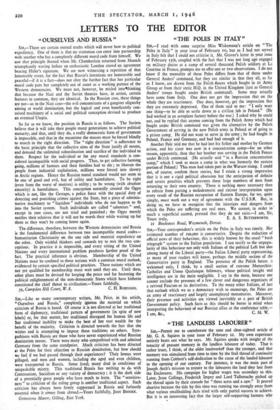LETTERS TO THE EDITOR
"OURSELVES AND RUSSIA" Si,—There are certain eternal truths which will never bow to political expediency. One of them is that no statesman can enter into partnership with another who has a completely different moral code from himself. We saw that principle flouted when Mr. Chamberlain returned from Munich triumphantly waving before an enthusiastic London crowd an agreement bearing Hitler's signature. We are now witnessing a repetition of that lamentable event, for the fact that Russia's intentions are honourable and peaceful—if it is a fact—does not alter the further fact that her particular moral code puts her completely out of court as a working partner of the Western democracies. We must not, however, be misled into•thinking that because the Nazi and the Soviet theories have, in action, certain features in common, they are identical. In the Russian case, these things are not—as in the Nazi case—the evil concomitants of a gangster oligarchy aiming at world domination, but the logical and even beneficently con- ceived machinery of a social and political conception devised to produce an eventual Utopia.
So far as we know, the position in Russia is as follows. The Soviets believe that it will take their people many generations to achieve political maturity, and that, until they do, a really democratic form of government is impossible, and that in the meantime the masses must be forced blindly to march in the right direction. The "right direction" is adherence to the basic principle that the collective aims of the State justify all means, and demand the unlimited subordination and sacrifice of the individual to them. Respect for the individual or for any moral standards is con- sidered incompatible with social progress. Thus, to get collective farming going, millions of farmers and their families had to die ; to liberate the people from industrial exploitation, millions were forced into slavery in Arctic regions. Hence the Russian moral standard would not seem to be one of good and evil, but of utility and harmfulness. To be right (even from the worst of motives) is utility ; to be wrong (with absolute sincerity) is harmfulness. This conception naturally created the Ogpu which is not, like the Gestapo, a police force with the special duty of detecting and punishing crimes against the State, but a piece of adminis- trative machinery to " liquidate " individuals who do not happen to fit into the Soviet system. Such individuals are called " saboteurs " and, except in rare cases, are not tried and punished ; the Ogpu merely notifies their relatives that it will not be worth their while waiting up for them as they won't be coming home again.
The difference, therefore, between the Western democracies and Russia is the fundamental difference between two incompatible moral codes— humanitarian Christianity on the one side and material expediency on the other. Only wishful thinkers and cowards try to mix the two con- ceptions. In practice it is impossible, and every sitting of the United Nations and every international problem produces further proof of the fact. The practical inference is obvious. Membership of the United Nations must be confined to those nations with a common moral outlook, evidenced by certain specified political practices. Those nations which are not yet qualified for membership must wait until they are. Until then, other plans must be devised for keeping the peace and for hastening the political enlightenment of the non-democratic States which have hitherto constituted the chief threat to civilisation.—Yours faithfully,


























 Previous page
Previous page